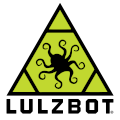
Open HardwareAssembly Instructions
Guides for installation and assembly of the LulzBot line of products made by FAME 3D LLC.

Guides for installation and assembly of the LulzBot line of products made by FAME 3D LLC.
(1) LulzBot HS+ Tool Head (Fully Assembled)
(1) Sample of LulzBot Green IC3D PETg filament
(1) Double Wiper Pad Mount
(5) wiper pads
(1) Red Scotch-Brite™ scrubber pad
7A
The tool head is attached with three screws. The print surface can be damaged if the tool head is allowed to fall onto the print surface. With one hand, support the tool head while following removal steps below.
7B
Using the 2.5mm hex key, unscrew the three M5 screws securing the tool head to the X-axis carriage. Remove the rear screw first, followed by the remaining top two screws.
7C
Remove the tool head from the printer by moving the tool head away from the printer.
Note: In previous versions of our tool heads, the Esteps (Extruder Steps Per Unit) were listed along the back of the tool heads for the customer to update. For the new HS+ Tool Head however, the Esteps are now set up within the firmware, and no manual updates are required.
8A
Press the tool head onto the X-axis carriage, aligning the cutouts on the back of the new tool head. Do not pinch any wires between the mount and the carriage.
8B
Secure it to the X-axis carriage by loosely screwing in the top two screws. Leave the top two screws loose.
8C
Loosely screw in the last screw through the rear of the X-axis carriage.
8D
Tighten the top two screws.
8E
Tighten the rear screw.
10A
Cover the connector with the connector cover and attach it to the X-axis carriage using the three M3 screws and the 2.5 mm hex key.
10B
Channel the wires together going to down the vertical pathway on the cover mount, and try not to pinch any of the wires when securing the cover. Slide down carefully into place, and hold while screwing in.
12A
Install the latest version of Cura LulzBot Edition. It is important to have the LulzBot Edition of Cura, as it has preset machine configuration profiles built into it.
12B
Go here to install http://LulzBot.com/Cura.
12C
Plug in your LulzBot 3D printer to the power supply and power on your 3D printer.
12D
Once powered on, connect your 3D printer to your computer using the USB cable.
12E
Open Cura LulzBot Edition.
13A
In the top right-hand menu for Cura LE, Select the Settings drop-down arrow > Printer > Add Printer
13B
Select LulzBot Mini 2, HS+ | 1.2 mm, and click Add Printer.
(if you are using a printer other than the Mini 2, select the corresponding printer)
12C
Select Finish.
14A
From the drop-down menu at the top right-hand side of Cura LE, Select Manage Printers.
14B
Confirm that the LulzBot Mini 2 | HS+ | 1.2 mm is selected, and click Upgrade Firmware.
(if you are using a printer other than the Mini 2, select the corresponding printer)
14C
Select Automatically Update Firmware. The Update EEPROM checkbox should be checked by default. Close any dialog windows after the firmware has been updated.
Note: Always heat the hot end to extrusion temperature before attempting to remove filament. If switching between different material types, set the hot end to the approximate average extrusion temperature of the two materials.
16A
Once the hot end has reached the extrusion temperature of 205, remove the test filament used during factory calibration by entering 5 for the Extrusion amount in Cura LE. Click the Extrude button. Change the value to 60 and click the Retract button.
16B
Once filament has retracted 60 mm, squeeze idler inwards, and pull the filament out. You may need to loosen the idler slightly by turning the silver idler wheel clockwise.
16C
Tighten the idler by turning the silver idler wheel counter-clockwise if loosened.
Filament Loading Tip: Cutting the filament at an angle will help with inserting into the extruder.
17A
Load the sample filament into the extruder. Squeeze the idler arm inward and insert the filament into the extruder filament guide.
17B
Enter 60 in Extrusion amount and click the Extrude button.
17C
Purge factory filament by continuing to select the Extrude button until the hot end extrudes material.
17D
Level the X-axis by clicking the Level X Axis button.
Your first print: the LulzBot Carbon Fiber Wrench Download and Save
18A
Load the first print model
18B
Select the sample material: PETg and the Profile.
18C
Press the Print via USB button to start your print!